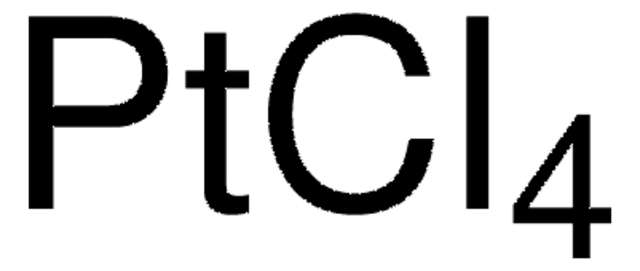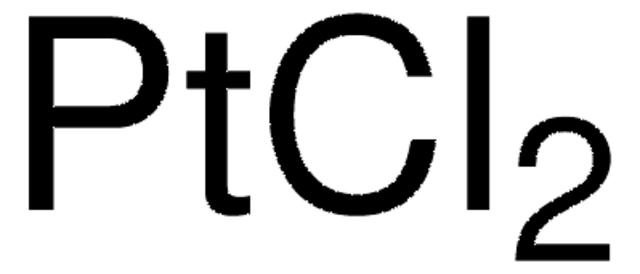P7082
Chloroplatinic acid hexahydrate
BioXtra
Synonym(s):
Hexachloroplatinic acid hexahydrate, Hydrogen hexachloroplatinate(IV) hexahydrate, Platinic chloride hexahydrate
About This Item
Recommended Products
product line
BioXtra
Quality Level
form
powder
concentration
≥37.5% Pt (gravimetric)
impurities
≤0.005% Phosphorus (P)
≤0.1% Insoluble matter
solubility
H2O: 0.5 M, clear, orange
anion traces
sulfate (SO42-): ≤0.05%
cation traces
Al: ≤0.0005%
Ca: ≤0.01%
Cu: ≤0.0005%
Fe: ≤0.001%
K: ≤0.005%
Mg: ≤0.005%
NH4+: ≤0.2%
Na: ≤0.01%
Pb: ≤0.001%
Zn: ≤0.0005%
storage temp.
room temp
SMILES string
O.O.O.O.O.O.Cl.Cl.Cl[Pt](Cl)(Cl)Cl
InChI
1S/6ClH.6H2O.Pt/h6*1H;6*1H2;/q;;;;;;;;;;;;+4/p-4
InChI key
PIJUVEPNGATXOD-UHFFFAOYSA-J
Looking for similar products? Visit Product Comparison Guide
Application
- Pt decorated MoS(2) nanoflakes for ultrasensitive resistive humidity sensor: This study explores the use of chloroplatinic acid hexahydrate as a precursor for depositing platinum on MoS2 nanoflakes, enhancing their performance in humidity sensing applications (Burman et al., 2018).
Signal Word
Danger
Hazard Statements
Precautionary Statements
Hazard Classifications
Acute Tox. 3 Oral - Eye Dam. 1 - Resp. Sens. 1 - Skin Corr. 1B - Skin Sens. 1
Storage Class Code
6.1C - Combustible acute toxic Cat.3 / toxic compounds or compounds which causing chronic effects
WGK
WGK 1
Flash Point(F)
Not applicable
Flash Point(C)
Not applicable
Personal Protective Equipment
Regulatory Listings
Regulatory Listings are mainly provided for chemical products. Only limited information can be provided here for non-chemical products. No entry means none of the components are listed. It is the user’s obligation to ensure the safe and legal use of the product.
ISHL Indicated Name
Substances Subject to be Indicated Names
ISHL Notified Names
Substances Subject to be Notified Names
JAN Code
P7082-1G:4548173982533
P7082-VAR:
P7082-BULK:
Choose from one of the most recent versions:
Certificates of Analysis (COA)
Don't see the Right Version?
If you require a particular version, you can look up a specific certificate by the Lot or Batch number.
Already Own This Product?
Find documentation for the products that you have recently purchased in the Document Library.
Customers Also Viewed
Our team of scientists has experience in all areas of research including Life Science, Material Science, Chemical Synthesis, Chromatography, Analytical and many others.
Contact Technical Service










